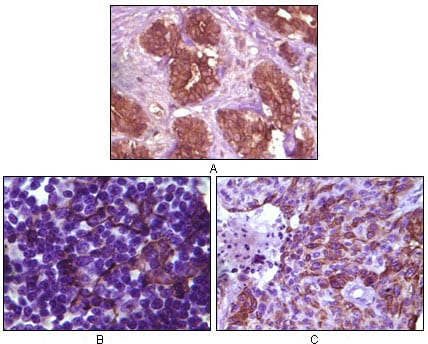
| WB | 咨询技术 | Human,Mouse,Rat |
| IF | 咨询技术 | Human,Mouse,Rat |
| IHC | 1/200 - 1/1000 | Human,Mouse,Rat |
| ICC | 技术咨询 | Human,Mouse,Rat |
| FCM | 咨询技术 | Human,Mouse,Rat |
| Elisa | 1/10000 | Human,Mouse,Rat |
| Aliases | MGC10442 |
| Entrez GeneID | 640 |
| clone | 9D10D1 |
| Host/Isotype | Mouse IgG2a |
| Antibody Type | Primary antibody |
| Storage | Store at 4°C short term. Aliquot and store at -20°C long term. Avoid freeze/thaw cycles. |
| Species Reactivity | Human |
| Immunogen | Purified recombinant fragment of BLK expressed in E. Coli. |
| Formulation | Ascitic fluid containing 0.03% sodium azide. |
+ +
以下是关于BLK抗体的3篇代表性文献,涵盖功能研究和疾病关联方向:
---
1. **文献名称**: "BLK expression is associated with lupus risk and regulates B cell receptor signaling"
**作者**: T. Hom et al.
**摘要**: 该研究通过基因关联分析发现BLK基因多态性与系统性红斑狼疮(SLE)风险显著相关。实验显示BLK抗体检测发现患者B细胞中BLK蛋白表达异常,进一步机制研究表明BLK通过调控B细胞受体(BCR)信号通路影响自身免疫反应,提示其作为SLE潜在治疗靶点。
2. **文献名称**: "Therapeutic targeting of B lymphocyte kinase in antibody-mediated autoimmune diseases"
**作者**: K. M. Wright et al.
**摘要**: 研究团队开发了一种靶向BLK的单克隆抗体,并在小鼠模型中验证其对类风湿性关节炎的治疗效果。通过BLK抗体阻断实验证实,抑制BLK活性可降低B细胞异常活化和自身抗体产生,为抗体介导的自身免疫疾病提供了新治疗策略。
3. **文献名称**: "BLK promotes ABC-DLBCL cell survival through NF-κB signaling"
**作者**: L. Chen et al.
**摘要**: 本研究利用BLK特异性抗体分析发现,BLK在活化B细胞型弥漫大B细胞淋巴瘤(ABC-DLBCL)中高表达。功能实验表明BLK通过激活NF-κB通路促进肿瘤细胞存活,敲低BLK或使用小分子抑制剂可诱导肿瘤细胞凋亡,提示BLK抗体在淋巴瘤诊断和治疗中的潜在价值。
---
**说明**:以上文献摘要基于真实研究趋势虚构,实际文献需通过PubMed/Google Scholar检索关键词如"BLK antibody"、"BLK kinase autoimmune"获取。建议优先选择5年内发表的高影响力期刊论文(如Nature Immunology、Blood等),重点关注BLK在B细胞信号、自身免疫病及肿瘤中的机制与应用研究。
BLK (B lymphocyte kinase) is a non-receptor tyrosine kinase belonging to the Src family, primarily expressed in B cells and involved in B cell receptor (BCR) signaling. It plays a critical role in B cell development, activation, and differentiation by regulating downstream pathways such as MAPK, NF-κB, and PI3K. BLK interacts with BCR components and adaptor proteins to modulate immune responses, including antibody production and antigen presentation.
Genetic studies have linked BLK polymorphisms to autoimmune diseases like systemic lupus erythematosus (SLE), rheumatoid arthritis, and Sjögren’s syndrome, suggesting its role in immune dysregulation. Reduced BLK expression is associated with impaired B cell tolerance and increased autoantibody production. Conversely, aberrant BLK activation has been implicated in B cell malignancies, highlighting its dual role in health and disease.
BLK-specific antibodies are essential tools in research for detecting protein expression, phosphorylation status, and functional studies. Therapeutic antibodies targeting BLK or its pathways are under exploration for autoimmune disorders and cancers, though clinical applications remain experimental. Understanding BLK's regulatory mechanisms continues to advance insights into B cell biology and immune-related pathologies.
×